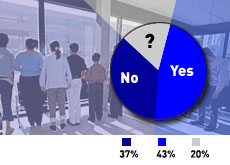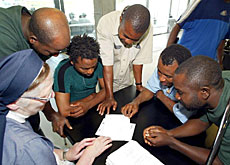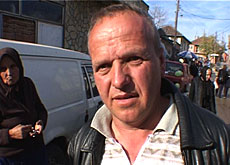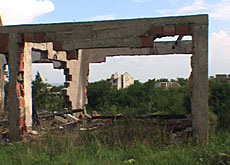Swiss vote on tighter asylum laws

The Swiss are voting on proposals put forward by the rightwing People’s Party aimed at tightening the asylum laws.
The initiative would limit the number of applications and cut benefits by slapping a work ban on asylum seekers.
The government and the Swiss Refugee Council both oppose the initiative, but the vote is expected to be close.
Aliki Panayides of the People’s Party dismisses claims that a “yes” vote would lead to Switzerland introducing some of the toughest asylum laws in Europe.
“We want to tighten the laws to stop abuse of the system,” she told swissinfo. “We are just following the lead of Germany, Austria and the Netherlands – all of which have the principle of sending asylum seekers back to safe third countries.”
The proposal would prohibit asylum seekers from filing an application in Switzerland if they had passed through a so-called “safe” country first.
Switzerland has readmission agreements with each of its neighbours, and Jean-Daniel Gerber, director of the Swiss Refugee Office, says experience shows that sending asylum seekers back is already proving hard to enforce.
“Experience tells us that only about ten per cent of asylum seekers can be sent back to safe third countries – the other 90 per cent stay here,” he told swissinfo. “So making it law would not help solve the problems at all.”
Shutting the door
Jürg Schertenleib of the Swiss Refugee Council echoes the criticism made earlier this month by the United Nations High Commissioner for Refugees, Ruud Lubbers, who said the proposals would see Switzerland shutting the door on most asylum seekers.
“Switzerland is surrounded by safe third countries,” Schertenleib told swissinfo. “As nearly 95 per cent of people making asylum applications in Switzerland arrive by land, almost everyone would be excluded.”
While the initiative aims to cut back on the abuse of Switzerland’s asylum system, Schertenleib fears that it will lead to a lot of requests from genuine asylum seekers being turned down, simply because everyone will be treated in the same manner.
He also rejects the People’s Party’s argument that the proposal will bring Switzerland closer to the European Union’s treaty on asylum – the Dublin agreement.
Switzerland is currently negotiating with the EU to become a signatory to the Dublin treaty in a second round of bilateral agreements. Schertenleib fears a “yes” vote would put those negotiations in jeopardy.
“Dublin makes clear which country is responsible for dealing with an asylum application,” Schertenleib said. “Why should the EU conclude a parallel treaty with a country which refuses even to deal with asylum applications?”
Increasing costs
The initiative also calls for a work ban, and Panayides maintains it would discourage people from coming to Switzerland simply to earn money.
“We want to frighten them off,” she said. “The aim for many people is to get here, to stay here and to work to have money to send back home.
“If we don’t let the asylum seekers work, they will go somewhere else because it won’t be attractive to stay in Switzerland.”
But Schertenleib rejects the People’s Party’s claims that a general work ban would help reduce costs and stop abuse. He is adamant that it will put extra pressure on benefit schemes.
“The costs of the work ban would be around SFr30 million a year,” he said. “And the cost of centralising the social welfare scheme for asylum seekers would add another SFr100 million a year to the bill.”
Switzerland already has a three-month work ban for asylum applicants, and a further three-month ban for those whose requests have been denied but are being appealed.
Humanitarian reputation
Opponents of the initiative are also worried about the damage a “yes” vote could do to Switzerland’s image abroad.
“Imagine the sign we are giving to the rest of Europe,” Schertenleib said. “If rich Switzerland says refugees are no longer welcome here, extremist parties in other countries may copy the solution and try to introduce similar measures.”
swissinfo, Jonathan Summerton
There are currently over 26,000 recognised refugees in Switzerland.
Around 95 per cent of asylum seekers arrive in Switzerland by land.
Recent opinion polls show 43 per cent in favour of the initiative with 37 per cent against.

In compliance with the JTI standards
More: SWI swissinfo.ch certified by the Journalism Trust Initiative





You can find an overview of ongoing debates with our journalists here . Please join us!
If you want to start a conversation about a topic raised in this article or want to report factual errors, email us at english@swissinfo.ch.